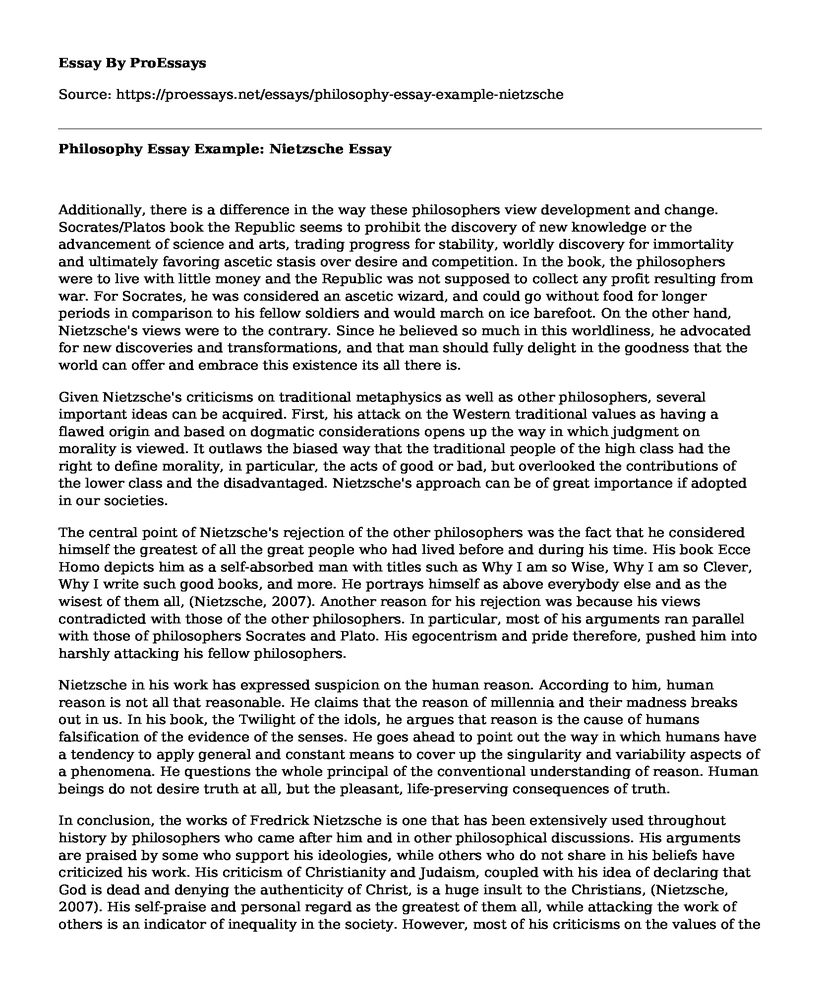Additionally, there is a difference in the way these philosophers view development and change. Socrates/Platos book the Republic seems to prohibit the discovery of new knowledge or the advancement of science and arts, trading progress for stability, worldly discovery for immortality and ultimately favoring ascetic stasis over desire and competition. In the book, the philosophers were to live with little money and the Republic was not supposed to collect any profit resulting from war. For Socrates, he was considered an ascetic wizard, and could go without food for longer periods in comparison to his fellow soldiers and would march on ice barefoot. On the other hand, Nietzsche's views were to the contrary. Since he believed so much in this worldliness, he advocated for new discoveries and transformations, and that man should fully delight in the goodness that the world can offer and embrace this existence its all there is.
Given Nietzsche's criticisms on traditional metaphysics as well as other philosophers, several important ideas can be acquired. First, his attack on the Western traditional values as having a flawed origin and based on dogmatic considerations opens up the way in which judgment on morality is viewed. It outlaws the biased way that the traditional people of the high class had the right to define morality, in particular, the acts of good or bad, but overlooked the contributions of the lower class and the disadvantaged. Nietzsche's approach can be of great importance if adopted in our societies.
The central point of Nietzsche's rejection of the other philosophers was the fact that he considered himself the greatest of all the great people who had lived before and during his time. His book Ecce Homo depicts him as a self-absorbed man with titles such as Why I am so Wise, Why I am so Clever, Why I write such good books, and more. He portrays himself as above everybody else and as the wisest of them all, (Nietzsche, 2007). Another reason for his rejection was because his views contradicted with those of the other philosophers. In particular, most of his arguments ran parallel with those of philosophers Socrates and Plato. His egocentrism and pride therefore, pushed him into harshly attacking his fellow philosophers.
Nietzsche in his work has expressed suspicion on the human reason. According to him, human reason is not all that reasonable. He claims that the reason of millennia and their madness breaks out in us. In his book, the Twilight of the idols, he argues that reason is the cause of humans falsification of the evidence of the senses. He goes ahead to point out the way in which humans have a tendency to apply general and constant means to cover up the singularity and variability aspects of a phenomena. He questions the whole principal of the conventional understanding of reason. Human beings do not desire truth at all, but the pleasant, life-preserving consequences of truth.
In conclusion, the works of Fredrick Nietzsche is one that has been extensively used throughout history by philosophers who came after him and in other philosophical discussions. His arguments are praised by some who support his ideologies, while others who do not share in his beliefs have criticized his work. His criticism of Christianity and Judaism, coupled with his idea of declaring that God is dead and denying the authenticity of Christ, is a huge insult to the Christians, (Nietzsche, 2007). His self-praise and personal regard as the greatest of them all, while attacking the work of others is an indicator of inequality in the society. However, most of his criticisms on the values of the society can bring about a great transformation in the society if implemented. These include his support for science and art, which bring about transformation and change. His advocacy on the emphasis of the present and not in the past as a basis for creativity and happiness is to a great extent an insight to development. Much focus should not be put on the past as should be on the present if the health and happiness of a people and culture is to be realized.
Works Cited
Nietzsche, F., & Large, D. (2009). Ecce homo: how to become what you are. Oxford University Press.
Nietzsche, F. W. (2007). Twilight of the Idols with the Antichrist and Ecce Homo. Wordsworth Editions.
Owen, D. (2014). Nietzsche's Genealogy of morality. Routledge.
Cite this page
Philosophy Essay Example: Nietzsche. (2021, Jun 15). Retrieved from https://proessays.net/essays/philosophy-essay-example-nietzsche
If you are the original author of this essay and no longer wish to have it published on the ProEssays website, please click below to request its removal:
- Personal Essay Sample - Spiritual Wellness
- Essay Sample on NCAA Ethics and Compliance Program
- Case Study on Moral Status Paper Example
- Ethics and Truth in Religion - Essay Sample
- Business Leaders: Role Model Duty for Ethical Practices - Research Paper
- A Moral Society: How Religion Provides Direction - Essay Sample
- Social Location: Understanding Its Impact on Our Development - Essay Sample







